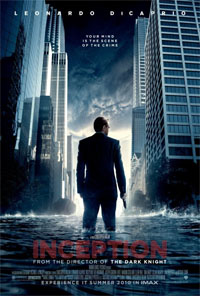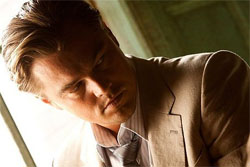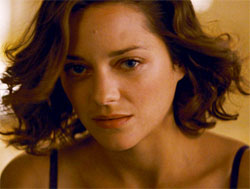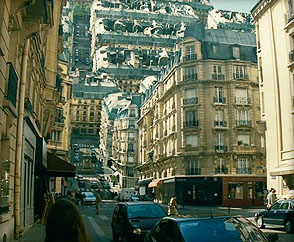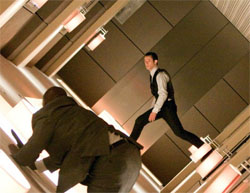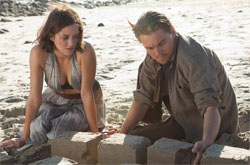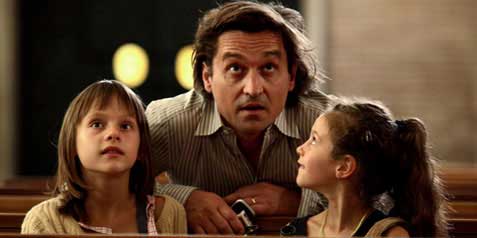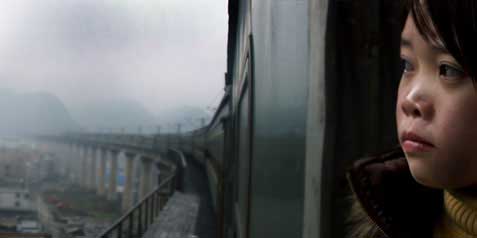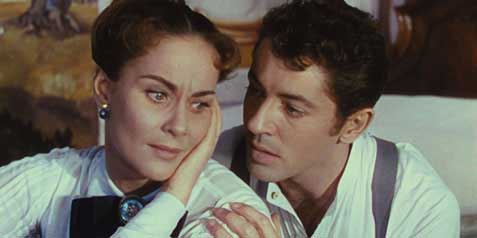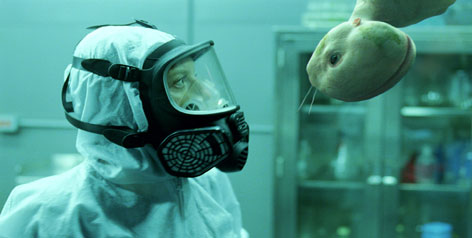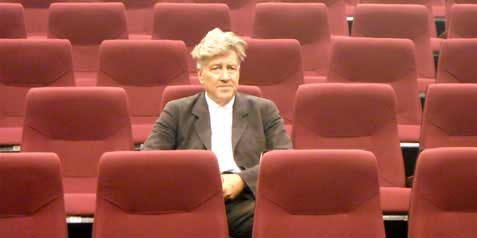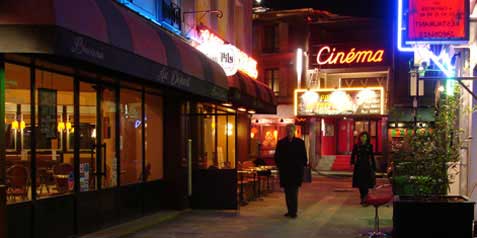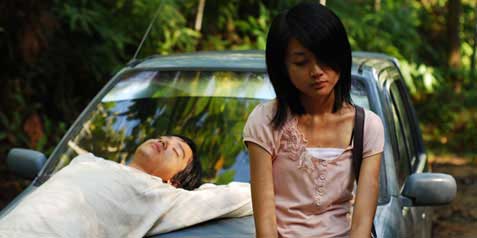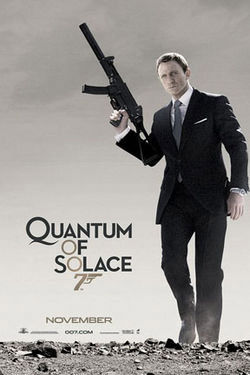
Quantum of Solace (2008, Dir. Marc Forster)
M: Bond, we need you back.
Bond: I never left.A car chase. Fractured bursts of machine guns. Head-on collisions barely averted. A beautiful purring gray Aston Martin reduced to a battered hulk with a missing driver-side door. Another daring escape from death, another deadpan quip from our hero, roll opening credits...
Quantum of Solace begins as many James Bond films do, but in its frenzied four minutes of prologue summarized above, one gets the sense that things are a little different. For one, the puckish humor that has characterized just about every other Bond setpiece in the past is absent. Even the sight of that driver-side door getting ripped from its hinges is a throwaway -- Bond (Daniel Craig) is too busy avoiding perforation to raise a laconic eyebrow at the sight. The entire sequence is an assault of fast cuts, images condensed to near-blurs, the "you are there" aesthetic codified by Paul Greengrass in his Bourne films (no surprise that the second-unit director is Dan Bradley, who filled the same role in the latter two Bourne movies). And when it comes time for Bond's payoff quip, the moment is caught in an unexpected freeze-frame, any potential chuckles caught in our throats as we regard the frozen countenance of our hero, awaiting a twinkle in his eye that never arrives.
So it is with the rest of the movie. Make no mistake,
Quantum of Solace has a sense of humor, but it's the kind best suited for the gallows -- witness the scene where Bond severs an assailant's femoral artery and watches with a twinge of impatience as the man expires. Or another bit where Bond incapacitates another baddie in a bathroom, and imprisons him inside by tearing off the door handle and tossing it away as thoughtlessly as throwing away a chewing gum wrapper.
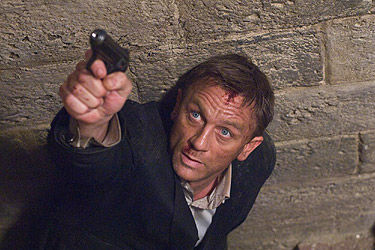
Of course we've seen this type of behavior before -- it was the
raison d'etre behind
Casino Royale, which reinvigorated the Bond mythos by presenting its hero as a bull in a china shop, happier busting heads and bruising his knuckles than choosing the best dinner jacket to wear or ordering a particular kind of Vodka martini. The thrill of
Royale lay in the frission between this cunning thug and the man we all know he becomes: suave, confident, world-weary, the feral intensity of an animal lingering behind his eyes. More than any Bond since Sean Connery, Craig embodies these traits, and his performance in
Royale still stands as a bracing reinterpretation of the character; when he announces himself as "Bond, James Bond" at movie's end decked out in a three-piece suit and machine gun, past Bond and present Bond are merged into something altogether new.
Quantum of Solace doesn't backtrack from that progression, but it doesn't necessarily advance it either. For the first time, the story is a direct continuation from the previous film: having apprehended the slimy Mr. White (Jesper Christensen), the money man behind Bond's previous nemesis Le Chiffre, Bond and M (Judi Dench) look forward to some good old-fashioned torture to wring out the skinny on the organization White works for. In a twist that wouldn't be out of place in paranoid 70's conspiracy thrillers like
3 Days of the Condor, it is revealed that the organization (aka Quantum) has implanted moles inside governments all around the world, and when Bond, still smarting from the betrayal and suicide of his love Vesper from
Royale, investigates on his own, indiscriminately killing off a few miscreants in the process, he finds himself distrusted by his own people, who in turn may be misled by Quantum's allies...
The promising setup is an interesting riff on Bond author Ian Fleming's vision of the world as a collection of cowboys and Indians, where even the cowboys must act like Indians from time to time. What to do when the cowboys actually
are Indians? While Fleming's Bond always had staunch belief in Queen and country even in his most cynical moments, Craig's everyman Bond can only survive by operating outside the system, trusting only his own abilities, all too knowing about the misdeeds that governments do as he sneers at his CIA colleague Felix Leiter (Jeffrey Wright) over the US "carving up" banana republics for its own benefit. It all snaps into focus about halfway through the picture when Bond infiltrates a secret meeting of Quantum members held under cover of a gaudy performance of
Tosca alongside an Austrian lake. In a pungent commentary on nefariousness being the domain of the upper class, the bad guys are respectable yuppies in black ties, while Bond steals his own tux and revels in his own impropriety when he announces his presence to Quantum: "You people should really find a better place to meet!" Bull in a china shop, indeed.
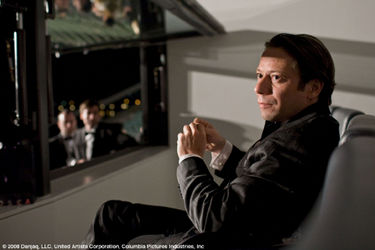
The opera sequence, punctuated by a wordless pursuit and shootout underscored by Puccini, is the film's clear highlight and one of the best passages in any of the latter-day Bond films. There are other pleasures to be had in
Quantum, as well: director Marc Forster does a better job than most Bond directors at
mise en scene as 007 jets from Haiti to Austria, Italy and Bolivia, and there is rugged intelligence in his visual design -- this is certainly one of the handsomest Bond movies to date. One must be more attentive to the plot than usual as Bond follows a paper-thin trail of clues that leads to prime villain Dominic Greene (Mathieu Almaric), but in contrast to the ransom-the-world megalomania of past Bond villains, Greene's scheme is refreshingly low-key yet insidious: suffice to say, Bolivia's innocent civilians will suffer in the process.
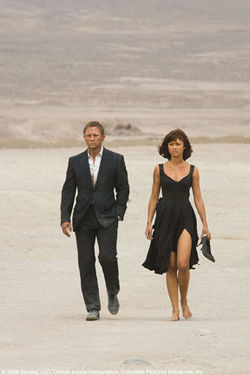
Low-key might be the best word to describe this film, despite some of its more outrageous elements. Clearly uncomfortable at the prospect of falling into formula cliches that have marred so many of the other Bonds, Forster is intent on coating
Quantum in a tasteful real-world patina. Instead of a superhuman henchman, we get the ineffectual Elvis (Anabole Taubmann), who is notable primarily for his toupee. Instead of a larger-than-life adversary, we get Dominic Greene, a shady businessman more at home brokering evil pacts in a hideous flower-print shirt than a sinister suit (Almaric is creepy but underused). Instead of imperious M doing what needs to be done come hell or high water, we get a flummoxed M browbeaten by the Minister of Defense, who may be under the direct sway of Quantum. Instead of briefings in mammoth conference rooms concerning the fate of the world, we get documentary-style montages of local Bolivians suffering from water shortages. Not since
The Man with the Golden Gun has a Bond film had such a sour outlook on the world and its characters; at least in
Golden Gun we had some slapstick (albeit bad) and the magisterial presence of Christopher Lee to break up the solemnity.
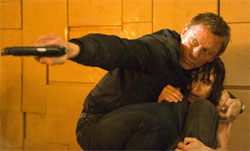
Casino Royale also played around with patented Bond formulas, but it was propelled by character nuances that the latest film lacks (character development in a Bond flick, fancy that!). Try as he might, Forster cannot camouflage the fact that the form and content of
Quantum is business as usual. Structurally,
Quantum even mirrors
Casino in its development: a bang-up footchase to kick things off, the middle third of the film given over to plot intrigue before it all culminates in a blow-'em-up-finale inside a confined space (in
Casino, a collapsing palazzo in Venice; in
Quantum, a heavily guarded hotel in the Bolivian desert conveniently outfitted with very flammable gas tanks). The devil with these films has always been in the details, and as the action scenes in
Quantum grow more protracted and unintelligible (a boat chase that lacks even a basic sense of geography, an airplane dogfight sabotaged by dodgy free-fall effects) one senses the plot curdling when it should be gaining momentum. Just when it's poised to go big, the film goes depressingly small, as if afraid to do anything, you know,
flamboyant.
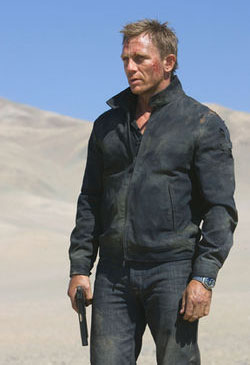
Lacking the novelty of
Casino Royale, Quantum of Solace would have stood up to its predecessor if it deepened and fleshed out Bond and his world -- it's a pity Forster seems more preoccupied with hurtling on to the next major plot point than letting the characters breathe. Olga Kurylenko (as a half-Russian, half-Bolivian(!) agent with her own revenge agenda) and Gemma Atherton (as a smartypants British agent) float in and out of the action, and Bond's old allies Leiter and Mathis (Giancarlo Giannini, wry as always) show up for brief spells, but Craig is very much a man alone in this one, his Bond taciturn and distant, with no one to bounce off. There's little left to focus on except for the fact that Bond gets just as bloody, bruised and sweaty as he got in the previous film -- already we're reaching the point of diminishing returns on that one.
The film's frustrations become apparent by the final conflagration -- for all of Forster's insistence on grit and realism, he and the scriptwriters still can't some up with anything beyond standard-issue explosions and hand-to-hand combat. And yet miraculously, the snowy denouement of
Quantum, wherein Bond settles his accounts with Vesper's ghost, is everything the rest of the film isn't: delicate, measured, succinct in its depiction of Bond as hard-bitten but ultimately loyal civil servant (as the dialogue atop this review attests). At odds with the rest of the film, it leaves a sliver of hope that this new iteration of Bond will indeed fulfill its promise and approach the grandeur of what the later Fleming books became; it would be a pity to see that potential squandered on future films as wan as this one.
Labels: daniel craig, ian fleming, james bond, quantum of solace

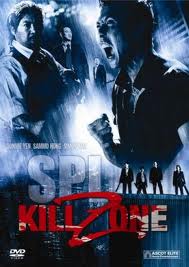 Kill Zone (2005, Dir. Wilson Yip)
Kill Zone (2005, Dir. Wilson Yip)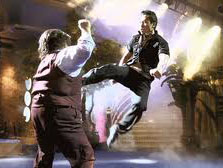
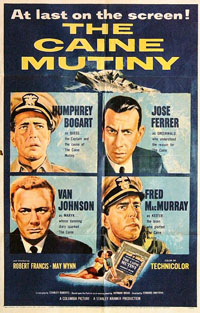
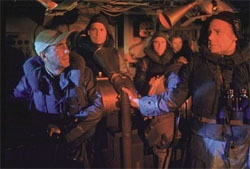
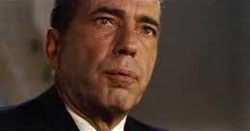
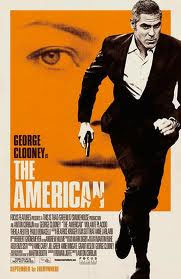 The American (2010, Dir. Anton Corbijn)
The American (2010, Dir. Anton Corbijn)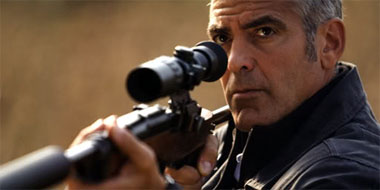
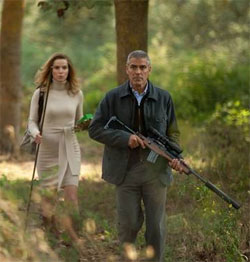 Still, this is Italy after all, the land of people and passions, and despite himself, the American is drawn into the lives of those around him: bemused interactions with the local priest who is out to save his soul (Paolo Bonicetti), faintly teasing repartee with his latest (and perhaps last) client Mathilde (Thekla Reuten), and most importantly, a half-guarded, half-passionate affair with a local prostitute named Clara (the aptly named Violante Placido). Juxtaposed against these detours into humanity is his latest job: the construction of a portable sniper's rifle for Mathilde. The scenes in which Clooney whittles, fiddles, deconstructs and reconstructs the rifle with a craftsman's ease are among the film's best. Despite his protests to the contrary (see the quote up top), the American is more than adept with machines -- he's quite the slick piece of machinery himself. (In a puckish bit of humor, renowned photographer Corbijn has Clooney pose as a photojournalist, rather than as the butterfly collector in Booth's novel).
Still, this is Italy after all, the land of people and passions, and despite himself, the American is drawn into the lives of those around him: bemused interactions with the local priest who is out to save his soul (Paolo Bonicetti), faintly teasing repartee with his latest (and perhaps last) client Mathilde (Thekla Reuten), and most importantly, a half-guarded, half-passionate affair with a local prostitute named Clara (the aptly named Violante Placido). Juxtaposed against these detours into humanity is his latest job: the construction of a portable sniper's rifle for Mathilde. The scenes in which Clooney whittles, fiddles, deconstructs and reconstructs the rifle with a craftsman's ease are among the film's best. Despite his protests to the contrary (see the quote up top), the American is more than adept with machines -- he's quite the slick piece of machinery himself. (In a puckish bit of humor, renowned photographer Corbijn has Clooney pose as a photojournalist, rather than as the butterfly collector in Booth's novel).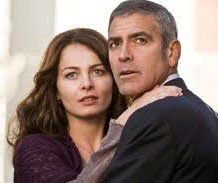 If you think the above suggests a simmering psychological study, you would be half-correct. In a welcome change from the excesses of most modern thrillers, Corbijn keeps things cool and elicits solid performances from his actors, his sinewy camerawork resisting the temptation to show off (save for a couple of gaudily lit nighttime shots that look like outtakes from U2's latest album art). In the end, though, the story is too slight to convince as a character study, and overdone symbolism (tattoed and real butterflies make constant appearances) and clunky dialogue take hold, with the affable Bonicelli saddled with lines that belong in a late-period Goddard film: "You are American. You think you can escape history. You live only for the present." Clooney's dogged (and hangdog) performance is credible, and it's a pleasing thrill when the American begins to suspect that he may be constructing the instrument of his own doom, but Corbijn sidesteps the existential implications -- and thus the thrust of Booth's novel -- in the latter half of the movie to focus on the doomed love between Clooney and Placido. Ah yes, the romantic fatalism of noir, what could be more American?
If you think the above suggests a simmering psychological study, you would be half-correct. In a welcome change from the excesses of most modern thrillers, Corbijn keeps things cool and elicits solid performances from his actors, his sinewy camerawork resisting the temptation to show off (save for a couple of gaudily lit nighttime shots that look like outtakes from U2's latest album art). In the end, though, the story is too slight to convince as a character study, and overdone symbolism (tattoed and real butterflies make constant appearances) and clunky dialogue take hold, with the affable Bonicelli saddled with lines that belong in a late-period Goddard film: "You are American. You think you can escape history. You live only for the present." Clooney's dogged (and hangdog) performance is credible, and it's a pleasing thrill when the American begins to suspect that he may be constructing the instrument of his own doom, but Corbijn sidesteps the existential implications -- and thus the thrust of Booth's novel -- in the latter half of the movie to focus on the doomed love between Clooney and Placido. Ah yes, the romantic fatalism of noir, what could be more American?